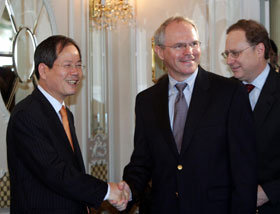U.S. backs China bid for informal N.Korea talks
(Reuters/tyhy56.com)
Updated: 2006-07-08 17:52
SEOUL, July 8 - The United States, facing opposition to proposed U.N.
sanctions against North Korea for this week's missile tests, said on Saturday it
backed China's proposal for informal talks.
"The Chinese have talked about putting together a six-party informal. We both
support that," the top U.S. envoy for North Korea, Christopher Hill, told
reporters in Seoul after a meeting with a South Korean official.
|
 |
|
U.S.
envoy to the six-party talks Christopher Hill (2nd R) meets his South
Korean counterpart Chun Young-woo as U.S. Ambassador to South Korea
Alexander Vershbow (R) participates in Seoul, July 8, 2006.
[Reuters] |
China has stepped up efforts to break the deadlock on the Korean Peninsula
nuclear issue as senior Chinese negotiators and their foreign counterparts met
on Friday to discuss Pyongyang's missile tests.
State Councillor Tang Jiaxuan said China has been committed to preserving
peace and stability on the Korean Peninsula, making it nuclear-free and pushing
forward with the Six-Party Talks.
"We will continue to make constructive efforts and maintain close contact
with all sides" on the nuclear issue, he told US Assistant Secretary of State
Christopher Hill during a one-hour meeting.
Hill said his country attaches importance to the six-nation talks and is
willing to settle the problems through diplomacy.
Hill was in China on Friday and flies to Japan on Sunday.
The six-party talks -- joining the two Koreas with Russia, China, Japan and
the United States -- came to a stop last November. But Hill said Washington was
not about to make concessions to bring North Korea back to the table.
SEPTEMBER DEAL
Last September, North Korea agreed to give up its nuclear weapons and
programmes in return for, among other things, the right to peaceful use of
nuclear energy and to normalised ties with Washington and Tokyo.
| 1 | 2 |  |
|